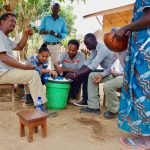Juliana Merçon, researcher at Universidad Veracruzana, is also digging deeper into the multiple and often unseen dimensions of well-being – those that are harder to measure. She goes one step further and invites us to reconsider how mainstream culture, that generally measures wealth according to possession of material goods, values these intangible, non-material aspects of human well-being. Consequently, Merçon suggests a reframing of our conception of poverty: her reflections are based on work, developed with individuals and communities living in areas of high biocultural diversity, where there might not be much money or material wealth, but nonetheless people do not consider themselves poor.
“Diverse contexts can teach all of us about sustainable ways of living – lessons that we need to learn if we are to stop biodiversity loss. But, we need to broaden and deepen our understanding of what makes up human well-being – those intangible aspects like connection to nature and connection to other human beings are also important components” Juliana Merçon, Universidad Veracruzana
There’s no denying the importance of addressing the lack of basic human needs like food, water and shelter. However, Merçon highlights the work of communities all over the world whose knowledge and practices have seen them sustain healthy ecosystems and ways of living that are rich in cooperation, solidarity, dignity and connection to nature.
 Wealthy in well-being
Wealthy in well-being